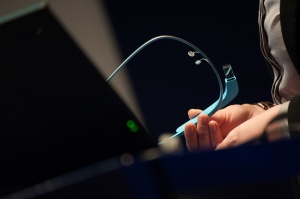Gabriel Muniz – Special to the Southern News
In recent years Google topped tech news headlines as it dabbled in everything from self-driving cars, delivery drones and contact lenses, among other projects in the works. Indeed, the search engine once singularly known for maximizing web searches to millions has turned into a multinational corporation, expanding research interests even further into fields as diverse as medicine, robotics and quantum computing.
Weeks after its recent pledge to invest $1 billion in another tech giant company – Elon Musk’s Space X – Google made an equally noteworthy announcement: its discontinuation of the Google Glass.
A type of wearable technology with an optical head-mounted display, Google Glass was hailed by some as a major breakthrough with a few kinks to be worked out, and by others, an unrealistic, over-priced, intrusive piece of technology.
At $1,500 a piece, from its 2012 inception to its recent discontinuation, the Google Glass was largely an internet sensation, with videos, blogs and articles addressing its sophisticated features on the one hand, and its disappointing elements on the other. Privacy concerns, though, would come to blanket the device’s reputation.
Most telling of the device’s potential for privacy violations were the oftentimes reported accounts of people being attacked in public bars and other places for wearing the futuristic glasses. Some users, perhaps, better put, “wearers” of the technology, would come to be dubbed “glassholes.”
 Raising safety concerns as well among drivers too caught up with reading emails and updating statuses, the Google Glass was even banned from certain businesses, with even the Motion Picture Association of America (MPAA) and the National Association of Theatre Owners (NATO) announcing a ban on wearable technology.
Raising safety concerns as well among drivers too caught up with reading emails and updating statuses, the Google Glass was even banned from certain businesses, with even the Motion Picture Association of America (MPAA) and the National Association of Theatre Owners (NATO) announcing a ban on wearable technology.
Still, so ubiquitous were the glasses on social media and even in certain sectors of society – the medical industry, to name one – that the potential benefits of the Glass have come, in some instances, to outweigh the negative costs. Many web articles speak of Google Glass’s discontinuation as merely temporal; the glasses are, according to IEEE, a popular online tech website, “resting.” The farthest thing from dead, a biz journal article has stated that it is, in fact, “rising.”
The Google glasses have certainly found a safe haven in Augmedix, one of 10 companies Google lists as certified Glass at Work partners, a group of companies focused on Glass-based enterprise services. Augmedix has been able to pioneer the service of enhanced record keeping, in effect shortening the amount of time that makes up a bulk of doctors day. Using the Google Glass, doctors can now verbally enter data or call up a patient’s electronic health record.
Another practical application of the Google glasses has been pioneered by the neuroscientist and Brain Power CEO Dr. Ned Sahin. He is set to begin data testing Google Glass software for children with autism this year.
Developing “the Empowered Brain application suite, software that is reported to feature personalized language coaching, gamified emotional training, and positive behavior assistance,” according to a Google Glass wikipedia entry, Dr. Nahin has been quoted saying that “many families find their children glued to the screen, looking down and away from the world, potentially further isolated.
Glass allows them to look up and into the world, and our applications give them coaching and rewards for making eye contact and engaging socially.”
Just to what degree Google glasses manage to become available for consumer purchasing remains to be seen, if it is to be seen at all. Google’s chairman, Eric Schmidt, however, certainly isn’t in the least worried. His bold declaration that the internet will disappear is a testament to how integrated man and machine will become.
So used to, if not desensitized by, “smart” phones, houses, watches, TV’s, and cars, the “internet of the things” will be a reality in the not too distant future where anything with internet capability and voice activation will be as normal and tech savvy as the phones and tablets currently used.
Google glasses, reappearing, then? Indeed, they likely will. While gone from the public eye at least for the moment will likely return, perhaps just under a different name and style.
Photo Credit: Syamanth Sreejith, Maik Meid



























































































